By: debbie lynn elias
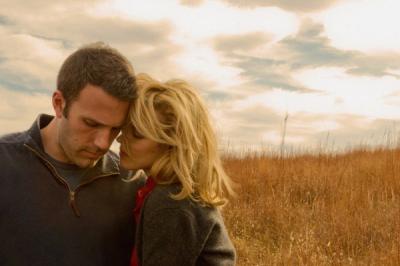
If one is able to look beyond the existential tedium so often found with Terrence Malick films, there is often a nuanced or subtle beauty, emotional exploration of the universe or messaging that emerges like a butterfly from a cocoon. It is this type of storytelling and filmmaking that has over the years created diametrically opposed viewpoints and camps of moviegoers when it comes to Malick; either you “get him” and love his films or you don’t. There is rarely anyone riding the fence.
With TO THE WONDER, Malick delivers yet another interesting exploration of the meaning of life, blending existentialism and religion in an at times convoluted commentary through visuals which, if you free your mind of preconceptions and the bondage of conventional critical thinking, delivers a powerful movie-going experience. Where Malick’s last film, Tree of Life, was insufferable and intolerable but for the creation montage, TO THE WONDER is more palatable, with a more poignant and pointed story, albeit miscast in some instances, and with bad sound mixing. Overall, however, thanks to the superb visuals and the emotion they evoke, TO THE WONDER an example of powerfully strong silent cinema. But don’t get me started on Malick “cheating” by using some footage from Tree of Life in TO THE WONDER.
Employing the same voice-over technique as in Tree of Life, Malick now tells the story of Neil, a man defined by the tightness and depth with which he loves his women, an ebb and flow of romance that bears the emotional hallmark of French impressionists. Yet interestingly, TO THE WONDER is more about the women and their emotions which in turn weaves the tapestry of Neil. Opening with the serenity and beauty of Mont-Saint Michel, we meet Neil and Marina, a couple obviously in the throes of a very spiritual and exciting new love. In hushed whispers as if to speak any louder would disturb the contemplative peace of “the wonder”, Marina tells us, “Love makes us one.” Captivating, spellbinding, almost enchanted.
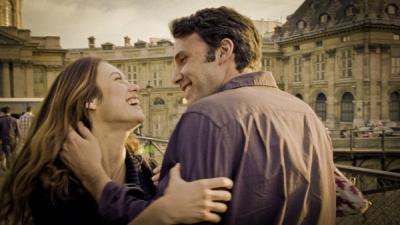
With unsettling quick edits, the dreamlike enchantment of Mont-Saint Michel becomes almost giddy with the appearance of Marina’s 10-year old daughter, Tatiana, as mother and daughter whirl and twirl around Paris with Neil almost a voyeuristic outsider. And then we are suddenly in the empty plains of Oklahoma. The warmth and calm of a rainy Paris day is replaced with the golden umbers, cloudless blue skies and streaming sunlight of the American Midwest. Silence permeates the scene as we watch and wonder. We watch Neil head off to his job as an environmental inspector, checking for ground and water contamination from local fracking; a somewhat prescient look at and commentary on his own relationships – on the surface things are beautiful, but what bubbles beneath? And Marina continues to whirl and twirl with girlish aplomb while Tatiana is sullen and alone with no friends at school. Three people, seemingly connected on the surface, but at the core, fractured. Fights break out between Marina and Neil. Furniture broken. Lamps thrown. Where there was once love, there is anger, nothingness. Marina soon realizes this is not the life she had in Paris and not the life she wants in America. She wants “the wonder.”
Someone else is looking for “the wonder” as well. In a parallel story that eventually intersects with Neil and Marina, local priest Father Quintana appears to have lost his way, his faith, and merely goes through the motions without passion or conviction, much like Neil and Marina. He delivers his Sunday sermons with a flat monotonous nature, never uplifting or inspiring his flock (which may explain why his flock is so few and the pews so empty). He ministers to the poor, the sick, the needy but again, with no joy, no encouragement, no “wonder”.
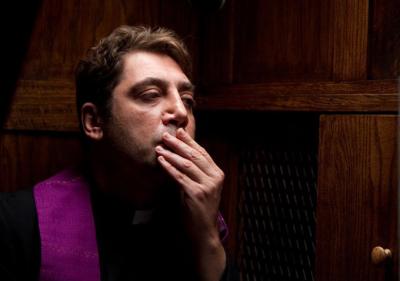
Realizing she wants more than the “nothing” her life with Neil has become, Marina and Tatiana leave Neil, opening him up for a passionate new experience with an old flame, Jane. The sun is warm, casting golden hues on this couple and their new love. They revel in each other and in the beauty of nature. But then, the light dims and they too grow cold.
Not finding “the wonder” back in Paris, Marina returns to Neil without Tatiana (apparently dumping the child on her father). Will they be able to find “the wonder” this time?
Although a somewhat diminished character, as Neil, Ben Affleck is effective and likeable. Strong, quiet. Moments of laughter. Affleck creates a full, layered, multi-dimensional emotional character with carefully edited imagery. A smile here, a thoughtful reflective look there, a furrowed brow or raging silent yell. And again, through the character, more metaphor. An environmental engineer that checks the ground and ground water for toxins. As more toxins seem to appear in the earth, the more toxic the relationship with Marina. Tacit wonder.
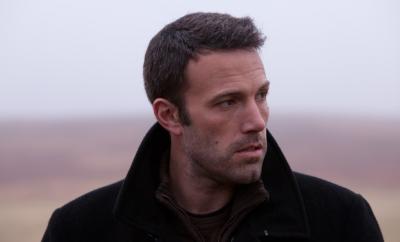
Stepping in as Marina, Olga Kurylenko is completely inappropriately cast. While this is definitely “outside the box” for which we know her (typically a strong, confident woman) – nothing but an irresponsible, freeloading woman with childish fantasies, everything is a game, she’s playing house, doesn’t work, gets a free ride to America, jumps on beds, only wants to play – while I commend Kurylenko for tackling the role, the performance is never believable and, in fact, becomes annoying. The character is so far out of the realm of reality that you feel sorry for Ben Affleck’s Neil. And Kurylenko and Affleck have no chemistry. You watch them and feel like you’re in a schoolyard at recess.
But then look at Rachel McAdams’ Jane. She and Affleck soar with their chemistry. Rich, believable, resonating. Cinematography filled with the golden rays of the sun, the golden umbers of the open grassy plains all lead to stunning emotional result as it showcases the warmth of a true love, a genuine love, especially when compared to the greyer and more stark, austere tones and set design of the Marina-Neil relationship. One feels “the wonder” at watching McAdams and Affleck together.
Javier Bardem has his own form of toxicity going on with a crisis of faith and utter despair as the beleaguered Father Quintana. Like Kurylenko, this is horrific miscasting. Bardem always looks dower which just raises the question of why did such a dower and miserable looking guy even become a priest. In fact, the persona and aura he projects with this character had me thinking “child molester.” There is no resolution to his crisis which detracts from the overall thematic tone.
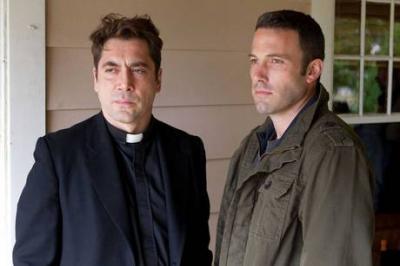
Written and directed by Terrence Malick, TO THE WONDER excels with the emotional ebb and flow of love and life captured not only with the character structure, but celebrated and metaphorically eulogized through Emmanuel Lubezki’s glorious cinematography. Breathtakingly beautiful. Angular, irregular framing highlights the irregularities of the lives of Neil and Marina and the imbalance between God and love in their lives. The shots of Mont-Saint Michel are both pastoral and majestic while scenes of Neil and Marina walking on the rubbery rippled ocean floor as the tide slowly comes in are fascinating and bear their own religious and spiritual commentary – the love between the two is seemingly as pure and above the fray as Christ and his “walking on water.” Extremely powerful visual metaphor. With the bulk of the film shot handheld, there is a freedom and capricious lightness to the visuals that while keeping with the feeling of looseness of story structure, plays well against the darkness of the crisis of faith, loss of relationships, loss of self and loss of wonder on which the characters and story is built.
Where Malick falls short with the technique in Tree of Life, here the visual/voice-over narrative format with sparse dialogue works well. Also notable is the editing which never lets you get comfortable or “settled in”, just like love and God never let you get comfortable. Interesting is that five editors have their hands in the mix -A.J. Edwards, Keith Frasse, Shane Hazen, Christopher Roldan and Mark Yoshikawa – which may be a contributing factor to the wonderful emotional contrasts of the visuals. However, where the editing does falter, and perhaps this is more story than the editing, is within the first half of the film which thanks to its unhurried nature, reaches a drag point of Malick’s patented tedium, something of which TO THE WONDER gloriously escapes for the bulk of the film.
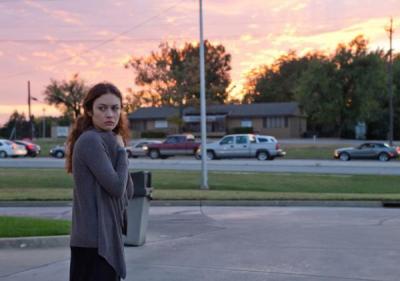
The most ineffective and poorly executed element of the film is the sound mix; extremely bad to the point that the score essentially drowns out the already hushed brevity of dialogue. On the flip side, however, is once again, the soundtrack and scoring. Malick excels with his musical selections. Original scoring by Hanan Townshend compliments the eclectic rich beauty of classical pieces from, among others, Wagner (“Parsifal”), Hayden (“The Seasons”), Berlioz , Bach, Gorecki, Tchaikovsky and Rachmaninoff. The soundtrack alone is worth the price of admission.
A rhythmic deliberateness to love and life, man’s relationship to God and his wonders, visual and emotional poeticism, TO THE WONDER rises above its several flaws, proving to be a sensory visual feast that captures the soul of life in all its wonder.
Written and Directed by Terrence Malick
Cast: Ben Affleck, Rachel McAdams, Olga Kurylenko, Javier Bardem












